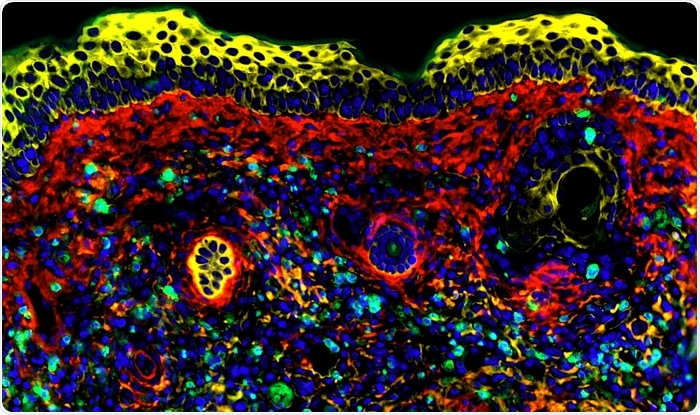Natural killer (NK) cells, which are part of the body’s innate, or first-line, immune response, interact with tumor cells, viral infections, and solid organ transplants, according to a new study. The findings, which were found by researchers at Massachusetts General Hospital (MGH) and published in Science Advances, might be utilized to help protect patients from cancer, invading infections, autoimmunity, inflammatory diseases, and transplant rejection.

New research from Massachusetts General Hospital explains how natural killer (Nk) cells’ interactions with extracellular matrix proteins regulate their function in solid organs, findings that could yield major therapeutic implications for cancer, viral infection, autoimmunity, and other inflammatory diseases. Here, Nk cells (green) are embedded in the collagen (red) rich matrix of the skin, which inhibits them from directly killing the epidermal keratinocytes (yellow). Image Credit: Maulik Vyas, PhD.
NK cells can successfully destroy target cells in the blood, but not diseased or malignant cells in tissues and organs such as the skin, gastrointestinal system, pancreas, or breast.
This profound lack of NK cell killing function in solid organs has perplexed the field of NK cell biology for the last 60 years.”
Shawn Demehri, MD, PhD, Principal Investigator and Cancer Immunologist, Massachusetts General Hospital
Demehri is also a Dermatologist in the Center for Cancer Immunology and Cutaneous Biology Research Center.
In recent years, Demehri’s research has revealed a fresh reason for why NK cells in solid organs lose their capacity to destroy target cells: Organs are made up of cells that are embedded in a thick extracellular matrix (ECM), which is a complex protein matrix that serves as a scaffold to keep organ shape and integrity.
When NK cells depart blood arteries and enter solid organs, interactions with ECM proteins cause an abrupt transformation in NK cell activity from killer to helper cell. NK cells generate chemicals that activate and assist surrounding immune cells as helper cells.
The fast killer reaction of NK cells in the blood and the delayed helper response of NK cells in tissues and organs, according to Demehri and his colleagues, can be explained by an adaptive selection pressure to extend human longevity.
Infection of the blood requires immediate control by NK cells to ensure host survival; however, the suppression of a direct killer function of NK cells in the peripheral tissues may prevent over-reaction to localized insults, which could predispose the patient to excessive tissue damage and the development of chronic inflammation.”
Shawn Demehri, MD, PhD, Principal Investigator and Cancer Immunologist, Massachusetts General Hospital
Demehri added, “Meanwhile, a helper function for the development of an overall more targeted, appropriately strong adaptive immune response may be best suited to combat viral infections in peripheral tissues.”
Collagens and elastin—major ECM proteins present in solid organs—were identified as critical regulators of NK cell activity in tissues and malignancies in this new study including skin transplant and mouse melanoma models.
Our fundamental discovery of how NK cells are regulated in peripheral tissues has wide-ranging implications for patients with various health conditions. Strategies to modulate NK cell–ECM interplay in organs can provide novel therapies to combat solid cancers, viral infections, inflammatory conditions, autoimmune diseases, and fibrosis, and to improve organ transplantation.”
Maulik Vyas, PhD, Study Co-Author and Postdoctoral Fellow, Center for Cancer Immunology, Massachusetts General Hospital
For the first time, the researchers demonstrated that losartan, a routinely used blood pressure medication, may induce a formerly resistant melanoma to become susceptible to NK cell death by preventing collagen formation in the tumor. Collagen is prominent in solid tumors, such as breast and pancreatic malignancies, making this discovery relevant.
Vyas noted, “Our data strongly support the concept of blocking collagen–NK cell interactions in combination with current immunotherapies for optimal treatment of solid cancers.”
“And our findings provide a strong rationale for future research to fully understand how ECM proteins regulate NK and other immune cell responses in health and disease. This will greatly expand the development of future therapies that exploit the interactions between ECM proteins and the immune system in the treatment of a large variety of diseases,” Vyas concluded.
Source:
Journal reference:
Bunting, M. D., et al. (2022) Extracellular matrix proteins regulate NK cell function in peripheral tissues. Science Advances. doi.org/10.1126/sciadv.abk3327.